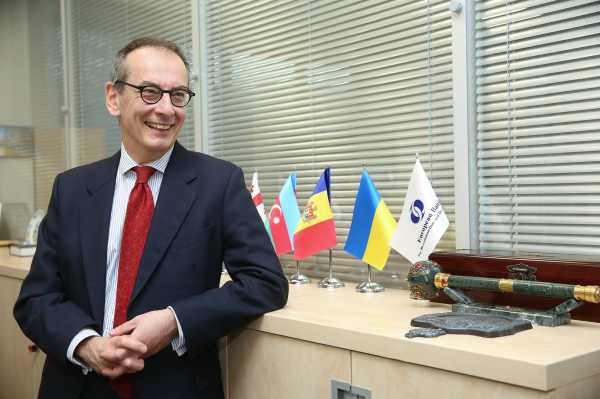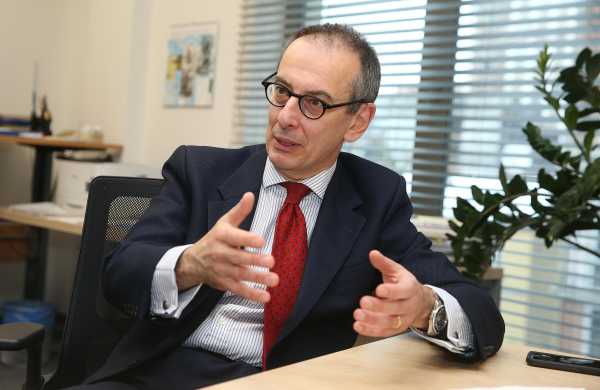Business Lockdown: EBRD regional director says businesses should endure crisis together

Latest news for today in Ukraine

Editor’s Note: Ukraine’s businesses are struggling after the country introduced nationwide restrictions on movement and travel starting on March 12. The restrictions have been strengthened since then and are set to last until at least April 24. Most businesses are closed with employees working remotely or not working at all. The exceptions include supermarkets, pharmacies, banks, parcel delivery services. The borders are closed to most forms of traffic, except Ukrainians returning by foot or by car. Most domestic transportation is closed or heavily restricted. Estimates range on how deeply the ensuing recession will harm Ukraine. The Kyiv Post talked with entrepreneurs about their daily struggles, asking how the quarantine has affected their ventures and what they are planning to do once it’s lifted.
We want to hear your personal story of survival during this national lockdown. Please contact us at [email protected].
Matteo Patrone
managing director of the European Bank for Reconstruction and Development (EBRD) in Eastern Europe and the Caucasus. It is an international financial institution, which uses investment as a tool to build market economies of more than 30 countries in Europe and Asia.
“By its nature, the EBRD is a countercyclical investor. We do not expect to lose business because of COVID-19. On April 23, our board of directors approved a massive increase in our Resilience Framework (international financial help to fight COVID-19) from 1 billion euros to 4 billion euros. Overall, we expect to invest up to 21 billion euros in 2020–2021 across 38 countries. Ukraine is no exception and our ambition is to maintain the same level of business as in 2019, partially transforming investment loans to liquidity and working capital support to weather the crisis.
“We had to move all our operations to work from home. The health, safety and well-being of our staff are a priority for me. Keeping the business on the road and the team safe, motivated and upbeat, while, at the same, adapting to a completely new work environment wasn’t easy. However, the team’s response has been outstanding, and by now, our operation is well oiled. Obviously, the nature of our business, which does not involve physical production and logistics, helps a lot.
“We are very much open for business. This is a moment of truth for institutions such as the EBRD. We are fully committed to standing by our countries of operations and sound businesses in temporary distress caused by the current pandemic. We are looking into the immediate response as well as the medium- and long-term recovery of our economies. As a triple-A rated institution with solid financials and supportive shareholders, the EBRD has the capacity to make a significant contribution in Ukraine and elsewhere.


Matteo Patrone, the European Bank for Reconstruction and Development’s regional managing director, speaks with the Kyiv Post on Feb. 13, 2019. (Kostyantyn Chernichkin)
“The physical restrictions have not held us back, on the contrary. We are in constant contact with our clients and the authorities to make sure to adapt our offer to what they really need. This provides the evidence on which we are building our response package. Despite being banned from travel, I think the EBRD maintains its critical advantage of a strong local presence.
“Working for an organization like the EBRD is both a privilege and a humbling experience. We are committed to ensuring sustainable development across all the countries of operation and this is what keeps us going as an organization. In Ukraine especially, the sense of purpose and deep commitment to the country’s progress is particularly felt by the entire team. I look forward to meeting all of my colleagues and partners in person soon.
“We are constantly in touch with the Ukrainian authorities, now as much as before the crisis. Never has this been more important in order to clearly understand what the country needs in the short and long term.
“In our view, the crisis will be characterized by a short recession followed by a sharp rebound in 2021. In the short term, it is imperative to protect citizens – their livelihoods and employment – which will also help to bolster the recovery. Macroeconomic stability is crucial and recent steps towards finalizing the Extended Fund Facility of the Internationa Monetary Fund are encouraging. In the medium term, it is very important for Ukraine to stay on the reform path. The crisis offers opportunities. Relentless effort and focus on the improvement of the investment climate, governance and predictability are crucial to ensure economic and social progress.
“The Ukrainian business community and society at large have already shown extraordinary resilience in past crises. We at the EBRD will do our best to support businesses with finance and advice. We are in this together, we will get through this together and we will also get out of this stronger – together.”
As of April 24: 193 people have died from COVID-19 in Ukraine; 601 people have recovered.
7,647 confirmed cases of COVID-19 in Ukraine as of April 24. The first case was identified on March 3.
Ukraine has extended its quarantine measures until May 11.
The measures shuttered most everything but hospitals, supermarkets, pharmacies, banks, gas stations, and other critical enterprises.
How the Ukrainian government has been responding: TIMELINE
Misinformation on coronavirus is going viral in Ukraine.
Doctor’s advice: How to stay safe.
Foreign Ministry: What you need to know about traveling to and from Ukraine now
Why the Kyiv Post isn’t making its coverage free in the times of COVID-19.
Coronavirus stops the Kyiv Post’s print edition for now.
Where to buy masks.
Effects on the economy:
COVID-19 is already inflicting harm on Ukraine’s economy.
Invisible Threat Lurks Undetected: Top stories from March 27, 2020 PDF edition.
The former minister of economy says half a million Ukrainians may lose their jobs in the COVID-19 crisis.